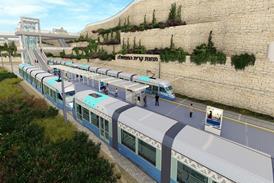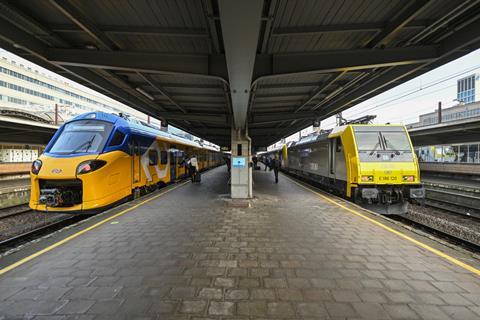
EUROPE: A new EuroCity Direct cross-border inter-city service connecting Brussels and Amsterdam was launched with the timetable change on December 15.
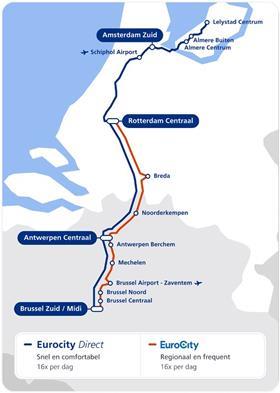
The hourly cross-border service is principally operated by Alstom Coradia Stream EMUs of Class ICNG-B, designated Class 3300 by NS and known locally as ‘Wasp’ units. The 21 eight-car sets are still being rolled out, and are initially being augmented by older Benelux push-pull formations of Belgian Type I11 coaches top-and-tailed by a pair of Traxx locomotives.
EuroCity Direct provides a limited-stop service linking Brussels Midi, Antwerpen Centraal, Rotterdam Centraal, Schiphol Airport, and Amsterdam Zuid, similar to the former Thalys services now branded as part of Eurostar. Several trains each day are extended to Lelystad Centrum, calling additionally at Almere Centrum and Buiten. Journey times between Brussels and Amsterdam are 2 h at weekends and 2 h 8 min on weekdays, when the trains make an extended 9 min stop in Antwerpen.
These limited-stop trains are augmented by an hourly EuroCity service calling at intermediate stations between Brussels and Rotterdam; each service provides 16 trains/day. The stopping trains are worked by the push-pull sets, although they are expected to be replaced by further Wasp units as the roll-out continues.
Multi-system fleet
The 21 Class 3300 EMUs are drawn from a build of 99 Coradia Stream trainsets ordered from Alstom by NS, mainly to work inter-city services with the Netherlands. Assembled at the Konstal plant in Chorzow, the domestic trains are equipped for 1·5 kV DC and 25 kV 50 Hz operation, while the cross-border variants can also operate at 3 kV DC in Belgium.
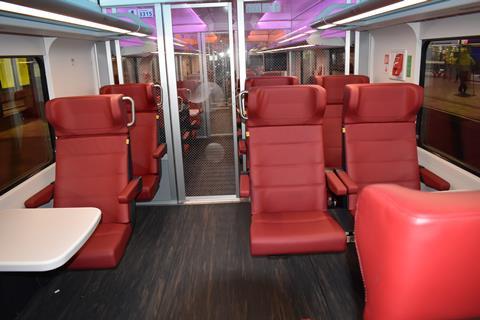
The eight-car aluminium-bodied trainsets are 164·9 m long and 2 780 mm wide, with a total weight of 285·7 tonnes (623 kg/m²). They have seats for 410 passengers and a floor height of 810 mm above rail. Each unit has four powered bogies — the two outermost in each four-car half-train — with eight 424 kW traction motors giving a continuous rating of 3 390 kW.
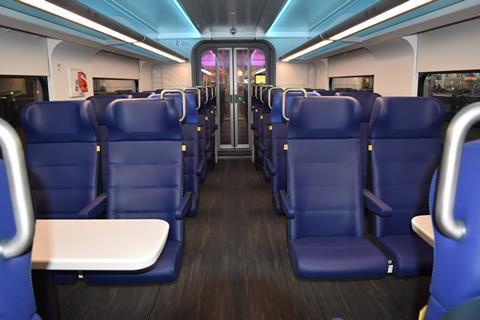
Although designed for a maximum speed of 200 km/h, the trains are currently limited to 160 km/h on the high speed lines in the Netherlands, partly because of cracking in certain viaducts between Hoofddorp and Rotterdam. On the conventional network they run at up to 135 km/h.
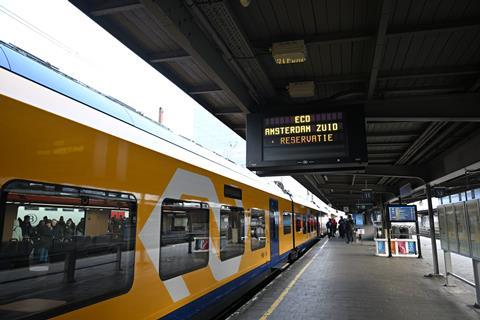
In addition to operating on three different power supplies, the cross-border trainsets are equipped to use various signalling and train protection systems. Between Lelystad and Hoofddorp, they use ProRail’s ATB EG, whereas Hoofddorp – Antwerpen – Brussels has ETCS and GSM-R from several manufacturers, apart from the section through Rotterdam which also uses ATB-EG.
Ticketing and capacity concerns
Whereas the SNCB-operated EuroCity services linking Brussels Midi with Rotterdam via Zaventem Airport are open to all passengers making domestic or international journeys at standard fares, the EuroCity Direct trains have compulsory reservation and dynamic pricing, with fares varying by train and time of booking — the highest prices are reportedly more than twice the cheapest. Seat reservations are not provided, and there is no onboard catering.
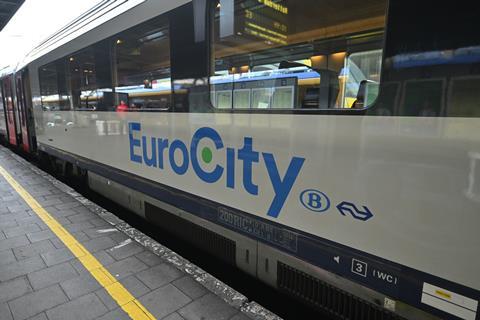
Within the Netherlands, EuroCity Direct services are open to domestic passengers with standard tickets between Lelystad, Amsterdam and Schiphol Airport, but a €2·90 supplement is charged for travel between Schiphol and Rotterdam. However, the trains cannot be used for domestic trips in Belgium. This has already led to a number of complaints, as it has effectively reduced the number of inter-city connections between Brussels and Antwerpen from five to four per hour, leading to overcrowding on the other trains. Given that the four-track corridor formed by Infrabel lines 25 and 27 (including the north-south tunnel under Brussels) is effectively saturated, there seems little prospect of adding any additional services.




